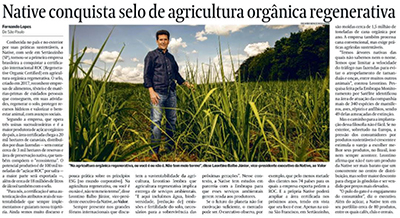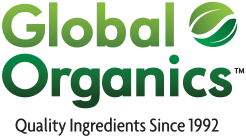Natíve Earns Regenerative Organic Certification
04.05.2022 | Author: Global Organics | Category: Cane Sugar & Sweeteners, Organic & Sustainability, Company News
Natíve Organics Earns Regenerative Organic Certification
Company is the first in Brazil to obtain this certification
Valor Economico, By Fernando Lopes — De São Paulo
“In regenerative organic farming, you either are or you aren't. There is no middle ground,” Leontino Balbo Jr, Executive Vice President of Native Organics, told Valor Economico
Photo: Ricardo Benicchio/Valor
Known throughout Brazil and abroad for its sustainable practices, Natíve Organics, based in Sertaozinho, became the first Brazilian company to achieve the international certification – Regenerative Organic Certified™ (ROC) for regenerative organic agriculture. The certification, established in 2017, is for food, textiles and personal care ingredients. ROC farms meet the highest standards int the world for soil health, animal welfare, and farmworker fairness.
Natíve, which operates three sugarcane mills and is the largest producer of organic sugar in Brazil, has certified 20,000 hectares of cane fields, spread over two farms – with an additional 3,000 hectares of reserves and native preservation area, which also make up the “ecosystem”. Their productive potential is 100 thousand tons of Regenerative Organic Certified™ sugar per harvest – most of it exported – in addition to about 18 million liters of certified neutral alcohol.
“For us, certification is an authentication of the real attributes of sustainability that we have always implemented and have always guided our trajectory. We see a lot of talk and little practice about ESG (environmental, social, governance) principles in the corporate world. In regenerative organic agriculture, either you are, or you are not. There is no middle ground,” Leontino Balbo Jr, Executive Vice President of Natíve, told Valor.

Environmental services
Balbo is a well-known figure at the international forums that discuss the sustainability of agriculture. He states that regenerative organic agriculture implies the delivery of environmental services, “… water, biodiversity, [reduction of] emissions and soil fertility, which are necessary for the survival of future generations.” Native has partnered with Embrapa Agricultural Research to ensure these ecosystem processes also generate income for producers.
If the future of the planet isn't motivational enough, the market might be. Balbo observes that at least half of their clients, in the 74 countries where they export to, request ROC sugar. Natíve is focused on regenerative organic and plans to bring more hectares under certification in the coming years. At the São Francisco mill alone, around 1.5 million tons of organic cane are milled per year. The company also processes conventional sugarcane but with sustainable agricultural practices.
“We have native trees that we don't even know the name of. We have to limit the speed of traffic on the farms to avoid running over anteaters and jaguars, among many other animals,” said Balbo. Satellite monitoring carried out by Embrapa, has identified more than 340 species of mammals, birds, reptiles, and amphibians in the company's area of operation, 49 which are endangered species.
High prices on the supermarket shelves
But the path to implementing this philosophy is not an easy one. Abroad, especially in Europe, growing consumer demand for sustainability encourages retailers to bring better products to market. This isn’t always the case in Brazil. Leontino says that it is not uncommon for a Natíve product to be cheaper than a competitor in the distribution center but suffer a greater discount to reach the shelves and be sold at higher prices. “The big step is consumer engagement,” says the Balbo.
In addition to sugar, Natíve has around 80 products in its portfolio, including coffee, tea, and cereal.
Note: article has been translated from the original Portuguese. To read the original article, please see:
https://valor.globo.com/agronegocios/noticia/2022/03/30/native-conquista-selo-de-agricultura-organica-regenerativa.ghtml


